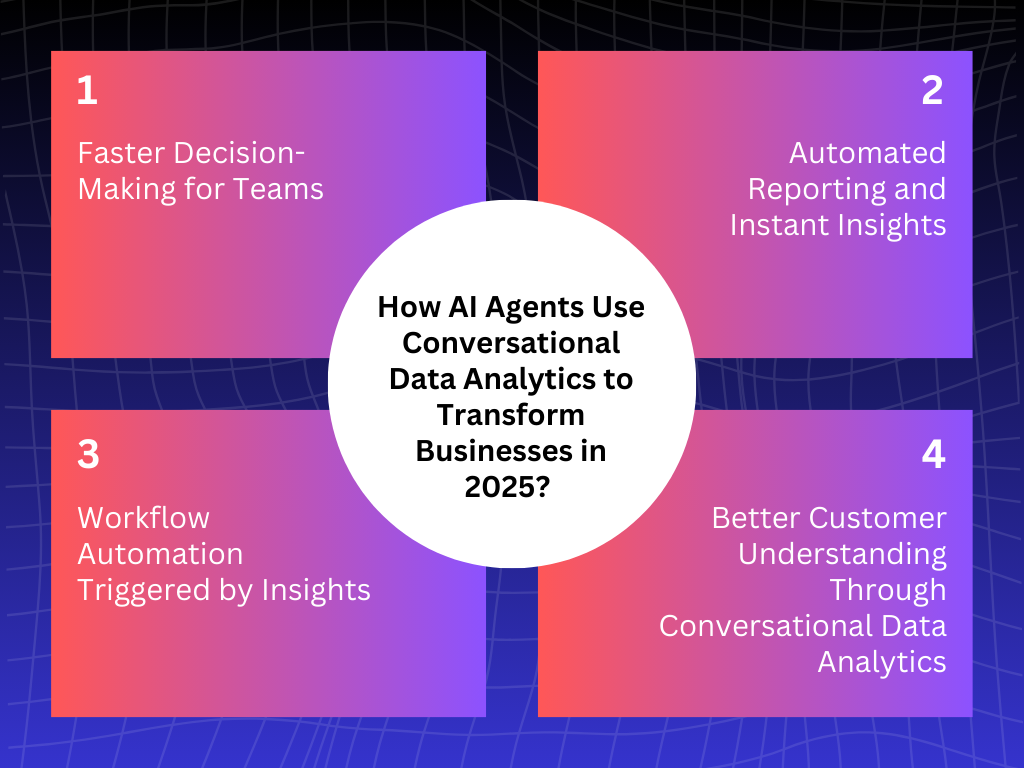.png)
AI Agents for Business- How Conversational Data Analytics Is Transforming Decisions, Automation, and Growth in 2025

If you look around, one thing becomes obvious. Businesses are no longer making decisions by digging through dashboards, waiting for analysts or downloading reports that nobody reads. Teams want answers instantly. Leaders want clarity at the speed of thought. And employees want workflows that run on autopilot instead of constant manual effort.
This is exactly why AI Agents for Business are taking over the spotlight in 2025.
Companies are moving from static dashboards to real conversational decision-making. Instead of clicking through filters, teams simply ask the system what is happening and get answers right away. Instead of waiting two days for a report, they receive real-time insights delivered automatically. And instead of manually fixing problems, AI agents trigger playbooks, automate workflows and keep everything running smoothly.
This shift from reports to real-time intelligence is not just a trend. It is becoming the new operating system for modern businesses.
What Are AI Agents for Business?
AI agents for business are intelligent, autonomous or semi-autonomous systems that can understand goals, analyze data, make decisions and take actions without needing constant handholding. They behave more like digital teammates than simple AI tools.
They can:
- process large datasets
- detect problems
- recommend solutions
- trigger workflows
- generate insights
- take actions across tools
How They Differ From Chatbots, RPA and BI Tools
Chatbots talk.
RPA executes rules.
BI tools show charts.
AI Agents for business do all three together. They understand language, analyze data, reason through situations and take actions across your entire tech stack.
This is where conversational data analytics fits in.
What Is Conversational Data Analytics?
Conversational data analytics allows you to talk to your data in natural language and instantly receive insights. It combines:
- NLQ (natural language querying)
- conversational BI
- predictive analytics
- sentiment and intent understanding
Think about it like this. Instead of checking ten dashboards, you simply ask:
- “How did our revenue shift last week?”
- “Why did customer sentiment drop?”
- “Which campaign brought the best ROI?”
And the agent gives you clear answers.
The Missing Link: Conversational Data Analytics
Most companies collect huge amounts of data, but the insights get lost in dashboards and siloed reports. Teams rarely have time to open dashboards every morning. Executives want summaries, not spreadsheets. Managers need answers, not raw data.
This is why conversational data analytics is becoming the foundation of AI Agents for business.
It allows teams to literally talk to their business. Ask a question. Get an answer. Instantly.
Why This Matters More Than Dashboards
- No learning curve
- No BI training required
- Faster insights
- Real-time updates
- Insights explained in plain English
And here is the real magic.
When the agent spots a problem, it does not just tell you. It can also act on it.
For example:
- “Sales dropped 20 percent” triggers an alert to your team
- “Customer complaints increased” launches a retention workflow
- “Inventory is running low” creates a purchase request
This is the insight to the action loop that transforms businesses.
How AI Agents Use Conversational Data Analytics to Transform Businesses in 2025
Let’s break down the biggest shifts happening right now.

1. Faster Decision-Making for Teams
Teams used to depend heavily on analysts and BI dashboards to understand what was happening. That dependency slows everything down.
With AI Agents for business, anyone can simply ask:
- “What changed in our pipeline this week?”
- “Where are we losing customers?”
- “Which region underperformed today?”
Answers that once took hours now take seconds.
It cuts friction. It speeds up decision-making. And it gives every team member the power to understand data without learning complex tools.
2. Automated Reporting and Instant Insights
AI agents now deliver daily and weekly business updates automatically. No one needs to request them.
They can:
- summarize performance
- highlight trends
- detect anomalies
- track KPIs
- notify teams of risks or opportunities
For example, your agent might message:
“Revenue is trending up by 9 percent this week. Paid campaigns contributed 42 percent of growth. Two regions show early signs of decline.”
This is smarter than any dashboard because you do not need to search for insights. They come to you.
3. Workflow Automation Triggered by Insights
This is where agentic workflows become powerful.
Imagine the system notices:
“Sales dropped 20 percent in the last 48 hours.”
Instead of waiting, the agent:
- alerts your sales manager
- opens a corrective playbook
- assigns tasks to reps
- pulls conversation transcripts to see why leads went cold
Another example.
“Customer sentiment is dipping this week.”
The agent can:
- categorize complaints
- send summaries to support managers
- escalate critical cases
- suggest actions to improve experience
Insight becomes action. And action becomes growth.
4. Better Customer Understanding Through Conversational Analytics
Customers tell you everything in their conversations. Support calls, chats, emails and feedback messages all carry hidden signals.
AI agents read and analyze these conversations to reveal:
- customer moods
- recurring pain points
- rising dissatisfaction
- competitors mentioned
- product gaps
- urgency levels
This helps customer support, sales, product and marketing understand what people truly want.
5. Reducing Operational Costs
AI agents take over the work that was previously manual and time consuming.
They reduce costs by:
- automating repetitive decision loops
- cleaning data
- generating reports
- triaging tickets
- detecting anomalies early
- improving efficiency
Companies that adopt AI agents often save significant time and reduce operational overhead.
Real-World Examples of AI Agents in Business Operations
This section gives you practical inspiration.
1. Sales Teams
- score leads automatically
- summarize pipeline performance
- prioritise accounts
- alert sales reps about deals going cold
A sales manager can ask, “Which deals need attention today?” and the agent gives an instant answer.
2. Marketing Teams
Marketers rely heavily on analytics. AI agents make their work easier by:
- summarizing campaign performance
- detecting audience shifts
- monitoring competitors
- analyzing sentiment around the brand
Instead of building reports, they get clear answers and next steps.
3. HR and Talent Teams
HR teams handle large amounts of communication. AI agents for HR can:
- detect attrition risks through sentiment
- help screen resumes
- highlight engagement issues
- analyze hiring funnels
This keeps teams proactive instead of reactive.
4. Finance Teams
Finance leaders love clarity. AI agents provide:
- revenue forecasts
- cost anomaly alerts
- expense summaries
- cash flow predictions
Instead of spreadsheets, they receive actionable narratives.
5. Customer Support Teams
Support teams often drown in tickets. AI agents:
- classify tickets
- track sentiment
- surface trends
- generate summaries for leadership
- suggest faster resolutions
This improves customer experience and reduces ticket load.
Why Conversational Data Analytics Is Better Than Dashboards
Here is the honest truth. Dashboards were built for analysts, not for everyday business users.
Conversational analytics solves this by turning complex BI into simple questions and answers.
Why It Wins
- anyone can use it
- no training needed
- insights arrive instantly
- real-time understanding
- deeper context from conversation signals
- higher adoption
Dashboards tell you what happened.
Conversational analytics tells you why it happened and what to do next.
How to Implement AI Agents in Your Business
Here is a simple roadmap that works for most companies.
Step 1: Identify Repetitive Decision Flows
Look for slow processes, manual tasks or repeated decision-making loops.
Step 2: Map Your Data Sources
Identify where conversations and insights live: CRMs, support tools, emails, internal chats or BI platforms.
Step 3: Choose the Right Agent Framework
Select a framework that allows conversation querying, real-time analytics and automated workflows.
Step 4: Put Governance in Place
Accuracy checks, approval workflows and audit logs are essential.
Step 5: Pilot and Then Scale
Start small to build confidence. Then expand across teams.
This step-by-step plan ensures smooth adoption and minimal disruption.
Future Trends: Agentic Workflows and Continuous Decision Automation
The next wave of business automation will be driven by continuous monitoring and autonomous correction. You will see workflows that fix problems before humans even notice them.
Emerging Trends
- business systems that self-correct errors
- fully autonomous monitoring agents
- multi-agent ecosystems working together
- conversational analytics becoming the default interface
- always-on decision intelligence
Companies that embrace these workflows will operate with clarity and speed that competitors cannot match.
Conclusion
Here is the big takeaway. AI Agents for business combined with conversational data analytics are creating a new operating system for decision making. They turn scattered insights into structured intelligence. They automate workflows. They help teams move faster. And they make businesses significantly more efficient.
If you want to build real AI agents for your business, Assistents by Ampcome can help you make it happen. We design agentic systems that understand your data, talk to your tools and automate your workflows. Our teams have delivered more than 100 enterprise AI projects and support long-term success with a team of 120 plus expert developers.
Whether you want conversational analytics, automated decision agents or full agentic workflows, we can build a solution tailored to your business.
Book a demo today!
FAQs
1. What are AI Agents for Business in simple terms?
AI Agents for Business are intelligent digital assistants that can understand goals, analyze data, make decisions and take actions across different tools. They go beyond chatbots because they can complete entire workflows, not just answer questions.
2. How does conversational data analytics help businesses make better decisions?
Conversational data analytics allows teams to talk to their data through natural language. Instead of digging into dashboards or spreadsheets, users can ask questions like “What changed in our sales pipeline today?” and get an instant answer. It makes insights easier to access, reduces dependency on analysts and speeds up decision-making across the company.
3. What makes AI agents different from RPA or dashboards?
RPA follows strict rules. Dashboards show visuals. AI Agents for Business combine both with intelligence. They understand context, reason through problems, analyze conversational signals and trigger actions across systems.
4. Which business teams benefit the most from AI agents?
Almost every team gains value, but the biggest impact is usually in sales, customer support, marketing, finance and HR. These teams deal with large amounts of conversations, decisions and repetitive tasks. AI agents automate insights, triage requests, summarize conversations and handle routine decision loops so people can focus on meaningful work.
5. Are AI agents safe for business operations?
Yes, they are safe when implemented with proper guardrails. Most businesses use human-in-loop checks, approval workflows, audit logs and secure access policies. Modern AI agent platforms also follow strong data privacy and compliance standards. With the right setup, AI agents improve accuracy instead of risking it.

Transform Your Business With Agentic Automation
Agentic automation is the rising star posied to overtake RPA and bring about a new wave of intelligent automation. Explore the core concepts of agentic automation, how it works, real-life examples and strategies for a successful implementation in this ebook.
More insights
Discover the latest trends, best practices, and expert opinions that can reshape your perspective
Contact us












